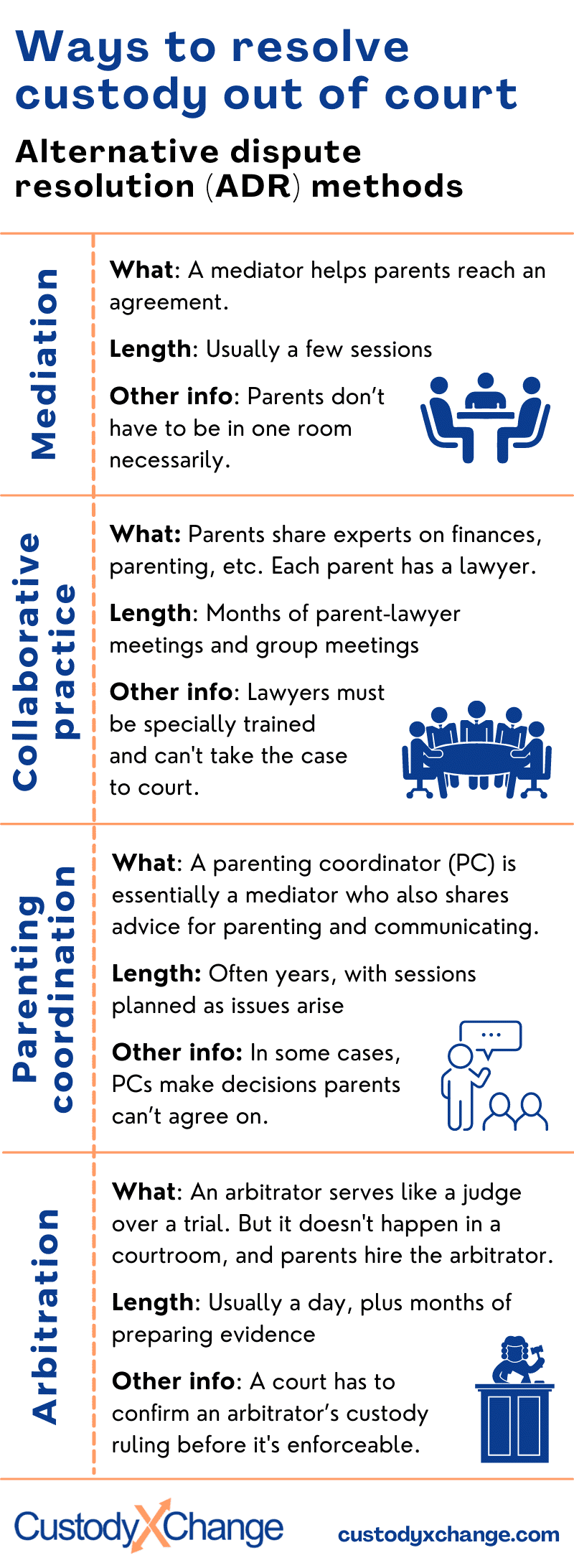Alternative Ways to Decide Custody in North Carolina
When people think of a dispute over a child, their minds often go straight to a courtroom. But seeking child custody does not mean you have to follow the traditional litigation process.
Parents can usually save time and money using one of the alternative dispute resolution methods below to settle a case.

Mediation
Mediators guide parents through contentious issues and propose compromises. If parents decide to settle, the mediator drafts a parenting agreement and submits it to the court. It becomes a permanent court order once the judge signs off.
North Carolina requires parents to attend mediation before starting a custody trial. Parents can also try private mediation at any point during their negotiations. Parents aren't obligated to settle, and they can stop both processes at any time.
Mediation sessions are confidential. Parents cannot litigate with information learned from the sessions, and mediators cannot report to the court on developments (except on agreements reached).
Court-mandated mediation
In court-mandated mediation, the court assigns parents a free mediator. You can be exempted from mandated mediation if you use private mediation, live more than 50 miles from the courthouse or have a case involving domestic violence or substance abuse.
In this type of mediation, parents can resolve issues related to legal and physical custody but not child support.
First parents go to orientation to prepare. No decisions are made here, so you don't have to attend with the other parent.
Next comes a mediation session that can last up to two hours. The mediator meets with both parents in one room. If parents make progress, they can schedule additional sessions.
Attorneys can't attend court-mandated mediation sessions, but they can review the parenting agreement before it goes to the court.
Private mediation
In private mediation, parents choose a mediator together. Private mediators typically charge $100 to $300 per hour, and most parents reach an agreement or decide to go to trial in three to five sessions.
In this type of mediation, you can resolve legal and physical custody as well as child support.
Private mediators may speak to parents in one room or in separate rooms. You can bring your attorney to private mediation.
Collaborative law
In collaborative law, parents work with lawyers and a team of experts to craft an agreement called a consent order.
Each parent must hire a collaborative attorney to represent them. These lawyers have specialized training in the collaborative process. Your team may also include a financial professional, divorce coach and child specialist, who all work for both parents.
Potential benefits of collaborative law include:
- Support: The team provides legal and emotional support.
- Control: Parents make their own decisions instead of a judge.
- Privacy: All discussions are confidential, though court documents are not.
- Speed: There's no waiting for court dates, and many parents reach an agreement in less than six months.
- Cost savings: Faster resolution than going to trial means fewer billable hours.
To start, all parties involved sign an agreement promising not to withhold information. You then attend sessions — some with the entire team, others with just certain members — until you and the other parent agree on a consent order and file it with the court.
If you and the other parent decide to go to trial, the collaborative lawyers must withdraw from the case. You will need to hire a new attorney or represent yourself.
Early neutral evaluation
In an early neutral evaluation, an evaluator reviews your case and hears parents' testimony. Then they provide an analysis of how a judge may rule.
Many parents use the evaluation to guide them to a settlement. If parents don't settle, the evaluator submits a report of his or her findings to the court.
Evaluators are neutral parties experienced in custody proceedings — usually judges or lawyers. Their rates range from $150 to $300 an hour, with parents often splitting the cost evenly. Evaluations typically occur in half- or full-day sessions.
Preparing for alternative dispute resolution
Preparation is as important when you decide custody through an alternative method as when you decide it through trial.
You still want to present convincing information — but to the other parent or an evaluator rather than to the court.
A proposed parenting plan with a visitation schedule presents your argument persuasively. You may also want to present messages exchanged with the other parent, a log of important interactions with the other parent, your child's expenses, and more.
The Custody X Change online app lets you create all of this in one place.

You can customize this to fit your situation with Custody X Change.
With a parenting plan template, customizable visitation calendars, parent-to-parent messaging, a parenting journal and an expense tracker, Custody X Change prepares you for any method of deciding custody in North Carolina.
It empowers you to get what's best for your child.
